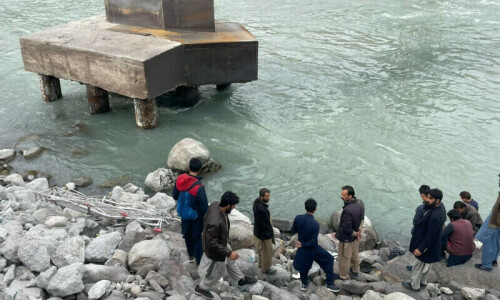KARACHI, March 26: The State Bank on Wednesday failed to sell its Treasury bills as banks resisted against the liquidity crunch created by the SBP and asked for higher return on their money.
This was also a sign that the banks insisted on higher cut-off yield in the wake of rising inflation along with the higher lending rates they charge from the borrowers.
The SBP had set a target of Rs45 billion, while it could hardly sell T-bills of Rs9 million for 12-month at a rate of 10.12 per cent, which was slightly less than the last auction rate of 10.13 per cent.
The SBP wanted to wipe out the entire liquidity of Rs49 billion scheduled to enter the banking system on Thursday as a result of maturity of government papers.
The SBP has been managing the liquidity through open market operations (OMOs) but for the last couple of weeks the banking system came under the tight grip of liquidity crunch.
The crunch forced banks to borrow through the SBP discount window at a rate of 10.5 per cent. The banks are quite eligible to place their liquidity at much higher rate than the discount rate, which could be a reason that banks retain their liquidity.
The SBP also frequently injected the liquidity into the market but the market remained dry as the demand was higher than the liquidity supplied by the SBP. The dryness of market is also in line with the State Bank strategy to curtail the in-
flationary pressure.
“Not buying the T-bills is a clear sign that the banks are asking to increase the return on T-bills,” said a banker.
Amjad Hussain, an analyst at a brokerage house said the T-bills rates will go up in next auctions mainly because of higher lending rates of banks and continuously increasing inflation.
He said the banks had doubled their investment in the T-bills during the last eight months of the current fiscal year reflecting the slow credit growth for private sector.
Bankers said that the SBP would come out with the OMOs to suck up the liquidity generated from the maturity of the government papers.
However, they said the OMOs would be a short-term outflow of liquidity from the market and the banks can get a better return.
“The main inflation is expected to reach the double-digits at the end of this fiscal year, which is alarming. The banks will have to face losses if they engage money for a longer period at the rates asked by the SBP,” said another senior banker.
The banks fear that the inflation could continue to go up as the fiscal deficit is expected to reach 6 per cent of the Gross Domestic Product (GDP), while the government is relying heavily on borrowing.
The SBP rejected all bids for 3- and 6-month bills.
“Participation was average but rates were very high, that’s why the State Bank rejected all bids for 3- and 6-month bills,” said a brokerage dealer.










































Dear visitor, the comments section is undergoing an overhaul and will return soon.